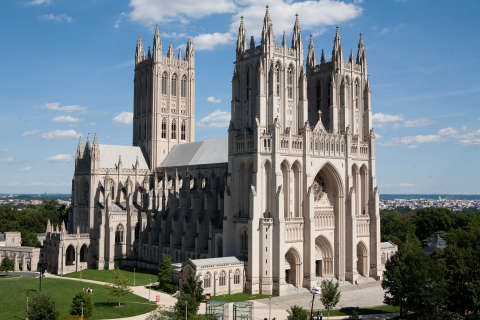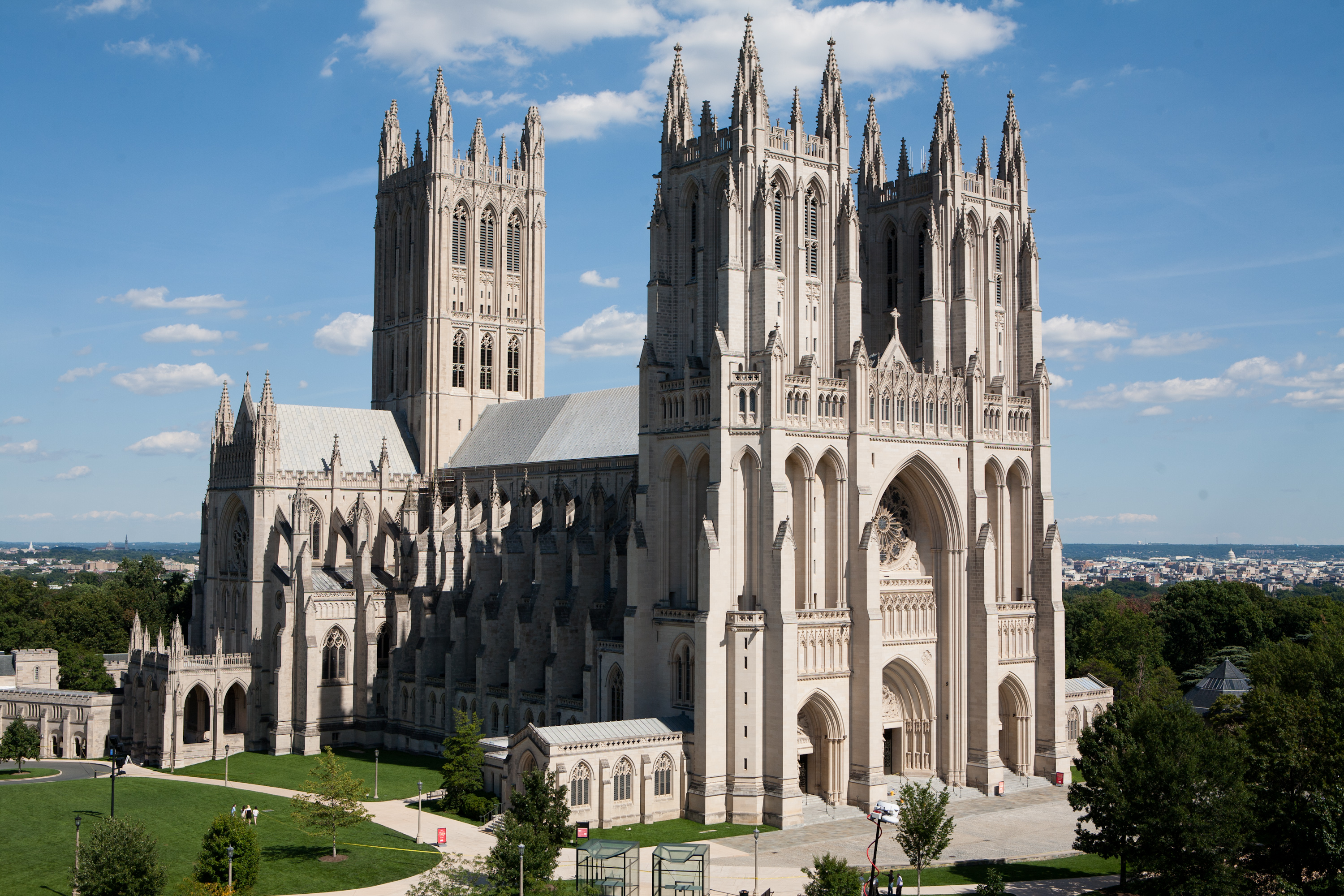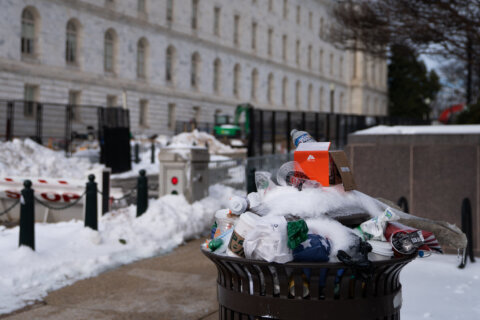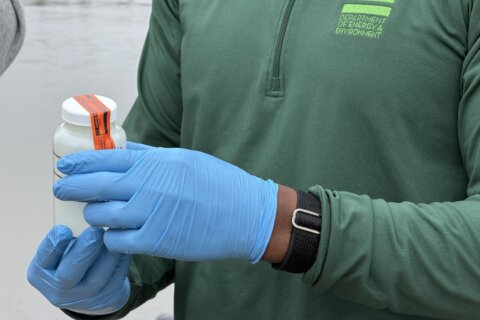
In a letter posted online, three priests at The National Cathedral called out President Donald Trump for his “violent dehumanizing words” against the city of Baltimore and stated that the faith leaders’ “time for silence” is “over.”
The letter comes days after Trump launched attacks on Twitter at Rep. Elijah Cummings (D-Md.), the city of Baltimore (parts of which lie in Cummings’ district) and Rev. Al Sharpton.
In the letter, the priests call out the attacks as more than a “dog-whistle,” stating that the question is less about the president’s “sense of decency” but the decency of those who do not take action.
“While we are accustomed to offensive language coming from the president’s Tweets on a regular basis, this was a real crossing of the threshold where his attacks went beyond his political adversary to really speak in a tremendously derogatory way towards the entire city of Baltimore,” said The National Cathedral’s Bishop Marianne Budde in a WTOP interview.
Trump called Cummings a racist after the president called the congressman’s majority-black district in the Baltimore area a “rodent-infested mess” where “no human being would want to live.”
On Monday, Trump attacked Rev. Al Sharpton on Twitter calling him a “con man, a troublemaker” who “Hates Whites & Cops!”
“When such violent dehumanizing words come from the President of the United States, they are a clarion call, and give cover, to white supremacists who consider people of color a subhuman ‘infestation’ in America,” the letter states. “They serve as a call to action from those people to keep America great by ridding it of such infestation. Violent words lead to violent actions.”
The letter is signed by Right Rev. Budde, Bishop of the Episcopal Diocese of Washington; Very Rev. Randolph Marshall Hollerith, Dean of Washington National Cathedral; and Rev. Canon Kelly Brown Douglas, Canon Theologian of Washington National Cathedral.
“I feel like there is a responsibility to take into account that when you speak from the highest office of the land you are giving justification to those who might take those words as justifying or condoning actions that could follow,” Budde told WTOP.
While she said that she has not yet heard from the White House in response to the letter, Budde says that she would “welcome a conversation with the president or anyone in the administration and those in all levels of government on how we might bring down the tone of rhetoric in political discourse.”
The letter can be read in its entirety below:
“The escalation of racialized rhetoric from the President of the United States has evoked responses from all sides of the political spectrum. On one side, African American leaders have led the way in rightfully expressing outrage. On the other, those aligned with the President seek to downplay the racial overtones of his attacks, or remain silent.
As faith leaders who serve at Washington National Cathedral — the sacred space where America gathers at moments of national significance — we feel compelled to ask: After two years of President Trump’s words and actions, when will Americans have enough?
As Americans, we have had such moments before, and as a people we have acted. Events of the last week call to mind a similarly dark period in our history:
“Until this moment, Senator, I think I never really gauged your cruelty or your recklessness. … You have done enough. Have you no sense of decency?”
That was U.S. Army attorney Joseph Welch on June 9, 1954, when he confronted Senator Joseph McCarthy before a live television audience, effectively ending McCarthy’s notorious hold on the nation. Until then, under the guise of ridding the country of Communist infiltration, McCarthy had free rein to say and do whatever he wished. With unbridled speech, he stoked the fears of an anxious nation with lies; destroyed the careers of countless Americans; and bullied into submissive silence anyone who dared criticize him.
In retrospect, it’s clear that Welch’s question was directed less toward McCarthy and more to the nation as a whole. Had Americans had enough? Where was our sense of decency?
We have come to accept a level of insult and abuse in political discourse that violates each person’s sacred identity as a child of God. We have come to accept as normal a steady stream of language and accusations coming from the highest office in the land that plays to racist elements in society.
This week, President Trump crossed another threshold. Not only did he insult a leader in the fight for racial justice and equality for all persons; not only did he savage the nations from which immigrants to this country have come; but now he has condemned the residents of an entire American city. Where will he go from here?
Make no mistake about it, words matter. And, Mr. Trump’s words are dangerous.
These words are more than a “dog-whistle.” When such violent dehumanizing words come from the President of the United States, they are a clarion call, and give cover, to white supremacists who consider people of color a sub-human “infestation” in America. They serve as a call to action from those people to keep America great by ridding it of such infestation. Violent words lead to violent actions.
When does silence become complicity? What will it take for us all to say, with one voice, that we have had enough? The question is less about the president’s sense of decency, but of ours.
As leaders of faith who believe in the sacredness of every single human being, the time for silence is over. We must boldly stand witness against the bigotry, hatred, intolerance, and xenophobia that is hurled at us, especially when it comes from the highest offices of this nation. We must say that this will not be tolerated. To stay silent in the face of such rhetoric is for us to tacitly condone the violence of these words. We are compelled to take every opportunity to oppose the indecency and dehumanization that is racism, whether it comes to us through words or actions.
There is another moment in our history worth recalling. On January 21, 2017, Washington National Cathedral hosted an interfaith national prayer service, a sacred tradition to honor the peaceful transfer of political power. We prayed for the President and his young Administration to have “wisdom and grace in the exercise of their duties that they may serve all people of this nation, and promote the dignity and freedom of every person.”
That remains our prayer today for us all.
The Right Rev. Mariann Edgar Budde, Bishop of the Episcopal Diocese of Washington
The Very Rev. Randolph Marshall Hollerith, Dean of Washington National Cathedral
The Rev. Canon Kelly Brown Douglas, Canon Theologian of Washington National Cathedral”









